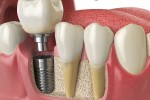Introduction
Dental implants are a long-term solution for missing teeth. They are durable, natural-looking, and effective. However, their lifespan can vary depending on several important factors. While many dental implants last 15 years or more, some may need attention sooner. Additionally, your oral hygiene, lifestyle, and health habits all play a part. Understanding what influences implant longevity helps you care for your smile more effectively. In this article, we explore the top factors that affect how long dental implants last.
Quality of Implant Materials
One of the first things influencing longevity is the quality of the materials used. Dental implants are typically made from titanium or zirconia. Titanium is most common due to its strength and high success rate. Additionally, it bonds well with bone, creating a stable foundation. Zirconia is also effective, especially for patients seeking metal-free options. However, the implant’s success depends not only on the material but also on design and manufacturing standards. High-quality components tend to last longer and perform more reliably. Therefore, always ask about the brand and quality of the implants being used.
Surgeon’s Skill and Experience With Dental Implants
Even the best implants can fail if placed incorrectly. The expertise of your dental surgeon plays a major role. Accurate placement ensures that the implant is stable and integrates properly with the bone. Additionally, experienced surgeons can anticipate and avoid potential complications. They also create treatment plans tailored to your specific anatomy. Furthermore, skilled practitioners are better equipped to spot early signs of failure. Choosing a qualified specialist significantly improves your long-term outcome. Therefore, never underestimate the importance of experience in dental implant success.
Jawbone Density and Health
Successful implants rely heavily on the condition of the jawbone. Strong bone allows the implant to integrate securely and remain stable over time. Conversely, if bone density is poor, the implant may not hold. Bone loss is common in patients with missing teeth for many years. However, bone grafts can sometimes restore volume before implant placement. Additionally, conditions like osteoporosis can affect bone health. Your dentist will assess your jaw during initial consultations. Overall, a strong foundation is essential for long-term dental implant success.
Oral Hygiene and Daily Habits
Like natural teeth, dental implants need regular care. Poor oral hygiene is a leading cause of implant failure. Brushing twice daily, flossing, and using mouthwash are basic yet crucial habits. Additionally, routine dental check-ups help monitor the health of surrounding gums and bone. Smoking, sugary foods, and poor brushing can increase the risk of infection or implant failure. Conversely, good habits maintain a healthy mouth and protect your investment. Therefore, consistent care is a must for long-lasting dental implants.

Smoking and Lifestyle Choices
Smoking significantly affects dental implant longevity. Nicotine reduces blood flow, which slows healing and weakens gum tissue. Additionally, smoking increases the risk of infection around the implant site. Alcohol abuse can also delay healing and compromise oral health. If you smoke, consider quitting before and after surgery. Your dentist will likely advise this as part of your treatment plan. Moreover, active lifestyles that prioritise health support better healing and maintenance. Good lifestyle choices are key to preserving your dental implants over the years.
Gum Health and Periodontal Care
Even if the implant itself is strong, poor gum health can lead to failure. Conditions like peri-implantitis—similar to gum disease—can damage the tissue and bone around the implant. Additionally, untreated gum disease spreads quickly and is hard to reverse. Regular cleanings, flossing, and early treatment of inflammation are essential. Furthermore, a periodontist may be involved in your care if your gum health is compromised. Protecting your gums is equally important as caring for the implant itself.
Bite Force and Teeth Grinding
Excess pressure on dental implants can cause them to wear down prematurely. Patients who grind their teeth, especially at night, may stress their implants. This condition, called bruxism, often goes unnoticed without dental evaluation. Fortunately, night guards can help protect implants from grinding. Additionally, correcting bite alignment reduces undue pressure. Your dentist may recommend adjustments or additional treatments. Identifying these problems early can prevent long-term complications. Minimising bite stress supports implant stability and increases their longevity.
Type and Location of the Dental Implant
Not all dental implants serve the same purpose. Single implants, bridges, or full-arch replacements have different demands. Additionally, implants placed in the back of the mouth often endure more pressure from chewing. Therefore, their wear rate may be faster than front implants. The number of implants, their angles, and how they support your prosthetic teeth also matter. A well-balanced design distributes force evenly and protects each implant. Discussing these details with your dentist ensures your implant choice fits your lifestyle and needs.
Maintenance and Professional Dental Implant Follow-Up
Regular dental visits are vital for implant maintenance. These appointments help detect minor issues before they become serious. Additionally, your dentist will professionally clean around the implant to remove plaque. X-rays may be used to assess bone health and implant position. Moreover, these check-ups provide a chance to reinforce good habits and review care techniques. Skipping appointments can lead to preventable complications. Ongoing support from your dental team plays a major role in long-term success.
Medical Conditions That May Influence Dental Implant Outcomes
Certain health conditions can impact the longevity of dental implants. Diabetes, autoimmune diseases, and uncontrolled systemic issues can slow healing and increase infection risk. Additionally, medications for osteoporosis or chemotherapy may affect bone integration. Before treatment, disclose your full medical history to your dentist. With proper management, many patients with chronic conditions still enjoy successful outcomes. However, careful planning and close monitoring are essential. Your health status influences not just the procedure but how long your dental implants last.
Conclusion
In summary, many factors affect the longevity of dental implants. These include material quality, surgical expertise, bone health, and oral hygiene. Additionally, lifestyle choices and medical conditions play key roles. Regular care, healthy habits, and ongoing professional support all contribute to lasting results. While dental implants are durable, they still require attention to maintain. Understanding these factors empowers you to protect your investment and enjoy your smile for many years. With the right care, dental implants can offer reliable, long-term function and confidence.
For more information and to book a consultation visit the ACIBADEM Beauty Center webpage.
Frequently Asked Questions
With proper care, dental implants can last 15–25 years or more for most patients.
Yes, but smoking increases failure risk. Quitting before and after treatment is strongly advised.
Yes. Once healed, dental implants feel stable, natural, and function like regular teeth.
Poor oral hygiene and gum disease are leading causes. Regular care is essential to avoid complications.
Absolutely. Age isn’t a barrier. Overall health and bone condition are more important than age.














